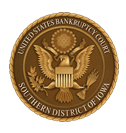The Coronavirus Aid, Relief and Economic Security Act (CARES Act) was passed to provide financially distressed consumers and small businesses greater access to bankruptcy relief for a period of one year. Key bankruptcy provisions include:
- Amending the Small Business Reorganization Act of 2019 (SBRA) to increase the eligibility threshold for businesses filing under new subchapter V of chapter 11 of the U.S. Bankruptcy Code from $2,725,625 of debt to $7,500,000. The eligibility threshold will return to $2,725,625 after one year.
- Amending the definition of “income” in the Bankruptcy Code for chapters 7 and 13 to exclude coronavirus-related payments from the federal government from being treated as “income” for purposes of filing bankruptcy.
- Clarifying that the calculation of disposable income for purposes of confirming a chapter 13 plan shall not include coronavirus-related payments.
- Explicitly permitting individuals and families currently in chapter 13 to seek payment plan modifications if they are experiencing a material financial hardship due to the coronavirus pandemic, including extending their payments for up to seven years after their initial plan payment was due.
The enactment of the CARES Act requires one-year amendments to five official forms to account for a new definition of “debtor” applicable to subchapter V of chapter 11 and a new exclusion from the definitions of “current monthly income” and “disposable income.” Because the Act took effect immediately upon enactment and its bankruptcy provisions are of limited duration, the Advisory Committee on Bankruptcy Rules has exercised the authority delegated to it by the Judicial Conference to make conforming technical changes to five bankruptcy forms (Official Forms 101, 122A-1, 122B, 122C-1, and 201).
- Official Form 101, Committee Note
- Official Form 201, Committee Note
- Official Forms 122A-1, 122B, 122C-1, Committee Note for 122 Forms
